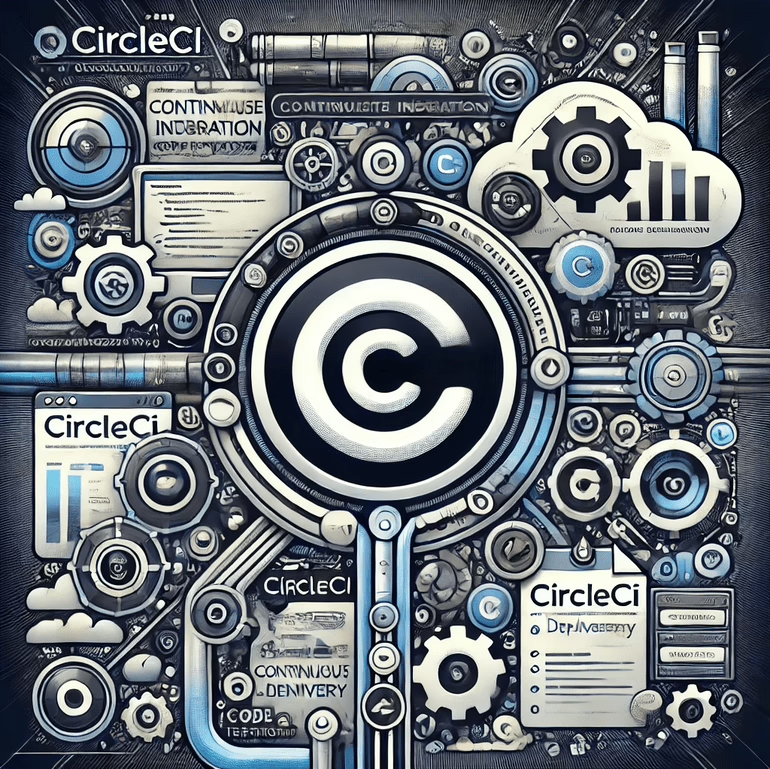Introduction: The Evolution of Software Development
In the ever-evolving landscape of software development, the ability to quickly and reliably deliver high-quality software is paramount. As organizations strive to shorten development cycles and improve software quality, the adoption of continuous integration (CI) and continuous delivery (CD) practices has become a critical aspect of modern DevOps. CircleCI, a leading cloud-based CI/CD platform, is at the forefront of this transformation, offering developers and DevOps teams the tools they need to automate and accelerate their software development processes.
CircleCI is more than just a CI/CD platform; it is a catalyst for innovation, efficiency, and collaboration within software development teams. By automating key aspects of the build, test, and deployment processes, CircleCI empowers organizations to deliver software faster, with fewer errors, and with greater confidence.
Understanding CircleCI: Key Features and Concepts
CircleCI is a cloud-based platform designed to streamline and automate the software development process through continuous integration and continuous delivery. It supports a wide range of programming languages, platforms, and tools, making it a versatile solution for development teams of all sizes.
1. Continuous Integration (CI)
At the heart of CircleCI is its ability to automate the continuous integration process. CI is a practice where developers frequently integrate their code changes into a shared repository, which is then automatically built, tested, and validated. CircleCI excels in this area by providing seamless integration with popular version control systems like GitHub and Bitbucket, triggering builds and tests as soon as code changes are pushed.
CircleCI’s CI capabilities ensure that code changes are continuously validated against a comprehensive set of tests, reducing the risk of integration issues and ensuring that only high-quality code is deployed. This automation not only speeds up the development process but also promotes a culture of collaboration and quality among development teams.
2. Configuration as Code
One of CircleCI’s most powerful features is its use of configuration as code. The build and deployment processes are defined using a .circleci/config.yml file, which is stored in the project’s repository. This YAML-based configuration file allows developers to specify the entire CI/CD pipeline, including the execution environment, dependencies, build commands, and test scripts.
The configuration as code approach offers several benefits, including version control of the pipeline itself, easy sharing and reuse of pipeline configurations, and the ability to make changes to the CI/CD process through code reviews and pull requests. This level of control and flexibility is crucial for organizations with complex and evolving CI/CD requirements.
3. Parallelism and Workflows
CircleCI offers robust support for parallelism and workflows, two key features that help reduce build times and manage complex CI/CD pipelines.
Parallelism: CircleCI allows multiple tasks or jobs to be executed simultaneously across different environments or containers. This parallelism significantly reduces the time required to complete the CI/CD pipeline, enabling faster feedback and quicker iterations.
Workflows: Workflows in CircleCI are used to define and orchestrate complex build and deployment processes that involve multiple jobs and dependencies. For example, a workflow might include separate jobs for building, testing, and deploying code, with dependencies that dictate the order in which these jobs are executed. Workflows provide the flexibility needed to manage sophisticated CI/CD pipelines and ensure that the entire process is efficient and reliable.
4. Docker Support
CircleCI is renowned for its strong support for Docker, a platform that allows developers to package applications and their dependencies into lightweight, portable containers. CircleCI’s native Docker support enables developers to build, test, and deploy Docker containers as part of their CI/CD pipeline.
Docker support in CircleCI is particularly beneficial for organizations that use containerization as part of their development and deployment strategy. It allows for consistent environments across different stages of the CI/CD pipeline, from development to production, ensuring that applications run smoothly regardless of the environment.
5. Integration with Version Control
Seamless integration with version control systems is a cornerstone of CircleCI’s functionality. By integrating with platforms like GitHub and Bitbucket, CircleCI automatically triggers builds and tests whenever code changes are pushed to the repository. This integration ensures that code is continuously validated, reducing the likelihood of integration issues and allowing developers to identify and fix problems early in the development process.
6. Customizable Execution Environments
CircleCI provides developers with the flexibility to specify custom build environments tailored to their project’s specific needs. Whether it’s choosing the operating system, runtime versions, or additional services required for testing and deployment, CircleCI’s customizable environments ensure that the CI/CD pipeline is aligned with the project’s technical requirements.
This level of customization is particularly valuable for projects with unique or complex dependencies, allowing teams to create environments that closely mirror production conditions.
7. Extensive Language and Platform Support
CircleCI supports a wide range of programming languages and platforms, making it a versatile solution for different types of projects. Whether you’re working with JavaScript, Python, Ruby, Java, or any other language, CircleCI provides the tools and integrations needed to build, test, and deploy your applications efficiently.
8. Deployment and Continuous Delivery
Beyond continuous integration, CircleCI also excels in continuous delivery, the practice of automatically deploying code to various environments after it has been tested and validated. CircleCI can be configured to deploy code to cloud platforms like AWS, Google Cloud, and Heroku, as well as to on-premises environments.
The ability to define deployment strategies and customize CD workflows allows organizations to automate the entire software delivery process, from development to production. This automation not only speeds up the delivery of new features and updates but also ensures consistency and reliability across different deployment environments.
9. Extensive Marketplace and Integrations
CircleCI offers an extensive marketplace of plugins and integrations that extend its functionality and allow developers to connect with additional tools and services. Whether it’s integrating with testing frameworks, monitoring tools, or notification services, CircleCI’s marketplace provides the flexibility needed to build a CI/CD pipeline that meets your project’s specific needs.
10. Notifications and Reporting
Keeping stakeholders informed of build and deployment statuses is critical to maintaining transparency and collaboration within development teams. CircleCI provides robust notification and reporting features, allowing users to receive real-time updates on the status of their CI/CD pipelines.
Notifications can be configured to alert team members of build successes, failures, or other important events, while detailed reports provide insights into build performance and outcomes. This visibility is crucial for maintaining the health and efficiency of the CI/CD process.
11. On-Premises Solution
While CircleCI is primarily known as a cloud-based CI/CD platform, it also offers an on-premises solution for organizations that require more control over their CI/CD environment. The on-premises solution provides all the benefits of CircleCI’s cloud platform while allowing organizations to manage their infrastructure and data according to their specific security and compliance requirements.
Use Cases for CircleCI: Powering Modern Software Development
CircleCI is a versatile tool that supports a wide range of use cases in software development and DevOps. Here are some of the most common scenarios where CircleCI excels:
Automated Testing
One of the most common use cases for CircleCI is automated testing. CircleCI can run a variety of tests, including unit tests, integration tests, and user interface tests, to ensure that code is functioning as expected. By automating the testing process, CircleCI helps developers identify and fix issues early, improving code quality and reducing the risk of defects in production.
Continuous Deployment
CircleCI is also widely used for continuous deployment, the practice of automatically deploying code to different environments after it has passed all tests. This automation allows organizations to deliver new features and updates to users more quickly and with greater confidence.
Cross-Platform Testing
For projects that require testing on multiple operating systems, platforms, or runtime versions, CircleCI provides a powerful solution. Its support for parallelism and customizable environments allows teams to run cross-platform tests efficiently, ensuring that applications work seamlessly across different environments.
Containerization
Projects that use Docker or other containerization technologies benefit greatly from CircleCI’s native support for container-based workflows. By automating the build, test, and deployment of Docker containers, CircleCI ensures that containerized applications are consistent, portable, and reliable.
Highly Customizable Workflows
For organizations with complex build and deployment requirements, CircleCI’s flexible and customizable workflows provide the control and precision needed to manage sophisticated CI/CD pipelines. Whether it’s orchestrating multiple jobs, defining dependencies, or integrating with additional tools, CircleCI offers the capabilities required to meet the unique demands of complex projects.
CircleCI and Curate Consulting: Elevating Your CI/CD Capabilities
At Curate Consulting, we recognize the transformative impact that CircleCI can have on an organization’s CI/CD processes. Our consulting services are designed to help businesses implement, optimize, and scale their CircleCI infrastructure to meet their specific needs.
Finding Specialized CircleCI Talent
One of the key challenges organizations face when adopting CircleCI is finding the right talent. Expertise in CircleCI requires a deep understanding of both the platform and the broader DevOps ecosystem. At Curate Consulting, we specialize in connecting businesses with top-tier CircleCI talent who can drive your CI/CD initiatives forward.
Our team of experienced recruiters works closely with clients to understand their unique needs and identify candidates with the skills and experience required to excel in CircleCI roles. Whether you’re looking to hire a CI/CD engineer, a DevOps specialist, or a software automation expert, Curate Consulting can help you find the talent you need to succeed.
Tailored CircleCI Solutions
Every organization is unique, and so are its CI/CD needs. Curate Consulting offers tailored CircleCI solutions that align with your business goals and technical requirements. Our consultants work with you to design, implement, and optimize CircleCI pipelines that streamline your software development processes and accelerate your time-to-market.
From setting up automated build and testing frameworks to integrating CircleCI with your existing DevOps tools, Curate Consulting provides end-to-end solutions that drive efficiency, reliability, and innovation.
Training and Support
Adopting CircleCI is just the first step. To fully realize its potential, your team needs to be proficient in using and managing CircleCI. Curate Consulting offers comprehensive training programs designed to upskill your team in CircleCI and related DevOps practices. Our training programs are tailored to your organization’s needs, ensuring that your team is equipped with the knowledge and skills required to maximize the value of CircleCI.
In addition to training, Curate Consulting provides ongoing support to ensure that your CircleCI infrastructure remains stable, secure, and efficient. Our support services include troubleshooting, performance optimization, and continuous improvement of your CI/CD pipelines.
Conclusion: CircleCI as a Strategic Asset
CircleCI is not just a CI/CD platform—it’s a strategic asset that can transform the way your organization develops and delivers software. By automating critical aspects of the software development lifecycle, CircleCI enables teams to deliver high-quality software faster, with fewer errors, and with greater confidence.

